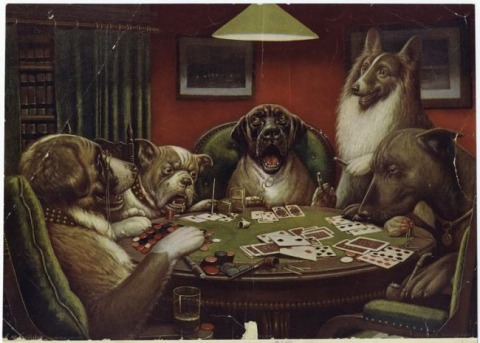
The Underground Thomist
Blog
The Sabbath and Natural LawMonday, 04-20-2015
This letter comes from a doctoral student and professor in a seminary in Spain. Question: Amongst our small faculty there is discussion concerning the relationship between natural law, the Ten Commandments, and the issue of the Sabbath. It is my understanding that the Ten Commandments are a summary of the natural moral law. However, we know that since the resurrection of Jesus, the “holy day” has changed from Saturday to Sunday. My questions are the following: If the Ten Commandments summarize natural law, then what day does the natural man “know” to be the day of rest/worship? Or has natural law itself changed with the coming of Christ? Do you personally exclude Sabbath worship from natural law? Reply: Thank you for writing. Here is how I understand the matter. (By the way, my favorite saint discusses all these things in much greater detail in Summa Theologiae, I-II, Questions 98-108.) Old Testament law contains several different kinds of precept: Moral precepts, such as the prohibition of murder; ceremonial precepts, such as the prohibition of mixing different kinds of fibers in the same garment; and judicial precepts, such as the rules about how many witnesses are necessary to convict someone of a crime. All of the moral precepts of the Old Testament law coincide with the natural law. They would have been knowable by reason alone, even apart from divine revelation; they bind universally and without exception; and they cannot be changed. The ceremonial elements in Old Testament law could not have been worked out by reason alone, so they depend on divine revelation. Although they held for the people of the old covenant, they do not hold universally, and they can be changed by divine authority. If taken not just in their words, but together with what they imply, suggest, and presuppose, the moral precepts of the Ten Commandments do summarize the natural law. For example, the commandment against adultery presupposes the institution of marriage, which is the unique setting for the practice of the sexual powers. Although it explicitly prohibits only one form of sexual impurity, this has always been understood as a placeholder, or metonymy, for all sexual impurity is wrong, but adultery is the most conspicuous example. The fact that the moral precepts of the Ten Commandments summarize the natural law does not imply that everything in the Ten Commandments is a moral precept. For example, we can analyze the commandment about the Sabbath into two elements, one moral, the other ceremonial. The moral element is that times and places be set aside for remission of labor and worship of God; this is a part of the natural law, and everyone should do it. The ceremonial element is that one of the times to be set aside be the seventh day; this command, which is not part of the natural law, was given to the old covenant community, but the Church by God’s guidance can make different arrangements for the new covenant community. As indeed He has, for in the new covenant community we rest and worship not on the seventh day, to commemorate God’s rest from the original creation, but on the first, to commemorate the new creation which was inaugurated with the resurrection of Jesus Christ.
|
Argument to the Best ExplanationSunday, 04-19-2015
All other things being equal, we ought to accept the hypothesis which best explains what we observe. For example, which hypothesis best explains what we actually see in the negotiations of the present administration with Iran: That the chief executive does not want Iran to obtain nuclear weapons but is incompetent at diplomacy? Or that he considers the nuclear supremacy of America unjust, finds it equitable that Iran should have nuclear weapons too, and merely has to seem to be against it? Yes, I think so too. Yet intelligent citizens consider it outrageous even to suggest the possibility. Tomorrow: The Sabbath and Natural Law |
Do All Dogs Go to Heaven?Saturday, 04-18-2015
A social scientist writes, “I just read an article in Public Interest in which the philosopher Edward Feser says Thomists ‘deny there will be non-human animals in heaven.’ Now, I understand the argument that animals on earth won't be resurrected in heaven. But he seems to be saying more.” Reply: I’m not sure whether Feser intended to imply more in his fine article, but let’s review Thomas Aquinas’s argument. A soul is the formal principle, or pattern, which makes the difference between a lump of dead flesh and an embodied life. In this sense all living things have souls, but they do not all have souls of the human sort. Our souls are rational; animal souls, like those of dogs, are merely sensitive. Now everything which the merely sensitive soul does pertains to its union with the body. But the rational soul has certain purely intellectual, non-material operations which are not dependent on its union with the body, and belong to the soul in itself. St. Thomas concludes that the soul of the dog has nothing that could survive the death of its body, but the soul of a human being does. I think this argument is correct as far as it goes, but I would qualify it in two ways. First, it doesn’t preclude the possibility of heavenly animals which had never existed in this life – and I don’t think Feser meant to imply that it did. It is only about the resurrection of animals which have existed in this life. Second, it does not absolutely preclude animal resurrection. It only prevents us from saying that sensitive souls have something which could survive the death of their bodies by their very natures. So far as we know, God could gratuitously preserve them by means which exceed their natural powers – just as we believe He will raise redeemed humans to the vision of Himself by means which exceed our natural powers. We simply have no information on this point. Tomorrow: Argument to the Best Explanation |
It’s Not True Until Simon SaysFriday, 04-17-2015
Such is the chemistry of the brain that the longer that good-night hug lasts, the more it produces the feeling of a bond, even if one is thinking "this doesn't mean a thing." The lesson would seem to be that unless you are already attached, it would be a good idea to keep those hugs short. Don't blame me. Blame oxytocin. I can imagine protests. "Why didn't anyone tell me that it only takes ten seconds or so for my brain to release oxytocin? Why didn't anyone tell me that my vulnerability might be even greater in the dark?" These are the wrong questions, for such little findings of brain science merely ratify common sense. Long before people knew about neurotransmitters, they understood that it was wise not to stay out too late, smart not to turn out the lights, and good to put limits on the touching of bodies. Long before they knew that the frontal lobes aren't fully developed until about age twenty-five, they knew that young people need supervision and shouldn't be left alone. Long before they knew how the endocrine system works, they knew that exhaustion and inactivity make not only the muscles but the virtues lose their tone, so that if one doesn't want the mice of temptation to turn into ravening beasts, one must get proper sleep and exercise. Long before they had statistical confirmation from sociologists, they knew that a child needs a mom and a dad. Once upon a time, such bits of mother wit, gleaned from centuries of experience, were passed on from generation to generation. To us they seem new because we have broken the generational transmission belt and forgotten what everyone used to know. Instead of turning to our grandmothers, we turn to biochemists and statisticians. We believe the obvious only when we count it on a calculator or isolate it in a test tube. Tomorrow: Do All Dogs Go to Heaven? |
Why Can't Johnnie's Teachers Reason Either?Thursday, 04-16-2015
One of the readers of this blog asks a good question about last week’s post, “Why Can’t Johnnie Reason?”: “So, Johnnie can't reason because he wasn't taught, because his teachers didn't learn or weren't taught. It's outside the scope of a brief post to trace the causal chain back to its source, but do you have a notion of what is responsible for the flight from reason broadly speaking? Because I assume that it began as a conscious rejection rather than as an inadvertently lost skill.” That’s a tough one, but I think there are at least two great tangles or clusters of causes. One of these clusters has to do with sheer pedagogical sloppiness. The other, which has taken longer to develop, has to do with the rise of skepticism over the last seven or eight centuries. Untangling these mare’s nests will take a long, long time. Our children and children’s children will have their work cut out for them. The skepticism of our day is quite different from the skepticism of most of the ancients. When Marcus Tullius Cicero called himself a skeptic, he merely meant that he was always open to new arguments, although in the meantime he would accept the opinion for which the best reasons could be offered. Today’s more radical skepticism, which tends to deny the very possibility of knowledge, has a number of contributing causes, for example the irrationalism of Martin Luther, the vastly influential Protestant Reformer, who wrote in his last sermon in Wittenberg (1546), “But the devil's bride, reason, the lovely whore comes in and wants to be wise .... As a young man must resist lust and an old man avarice, so reason is by nature a harmful whore. But she shall not harm me, if only I resist her. Ah, but she is so comely and glittering .... Therefore, see to it that you hold reason in check and do not follow her beautiful cogitations. Throw dirt in her face and make her ugly.” But a deeper and subtler cause is what philosophers call the “epistemological turn.” The wise approach to reality taken by thinkers like Aristotle and Thomas Aquinas set things before knowledge. They approached all kinds of things this way – material objects, volitions, qualities, whatever they may be – for no matter what we are studying, we have to know something before we can investigate how we know it. But in the modern era, we reverse this procedure. Before studying what there is to know, we insist on a critique of our ability to know anything at all. Extreme skepticism is but one of the bad results of this shift. Of course even the skeptic has to assume that something is true; otherwise he has no way to decide what to do and how to live – the springs of action lose their springiness. In practice, then, extreme skepticism turns into its opposite, extreme conventionalism. For the supposed skeptic doesn’t really reject prejudice; he unquestioningly accepts every prejudice that has learned to put on skeptical airs. Pedagogical sloppiness has causes of its own. Alexis de Tocqueville drew attention to the hurriedness of modern life, which leads to an intellectual demand that everything be made easy. First, books were made easier; now, with the rise of the technologies of glibness, students are losing the very habit of reading books. Another cause is the Pragmatist educational reforms of the early twentieth century, which held that facts keep changing and the only thing worth teaching is how to learn. You would think that “learning how to learn” would include learning logic, wouldn’t you? But no, Pragmatists think that even the rules of logic are no more than useful generalizations which at some point may cease to be useful. Then there are all our destructive faux-democratic notions, for example that college should be a universal certifier (which requires dumbing it down so that even people who cannot genuinely benefit from higher education can be pushed through), and that students should evaluate their teachers (which punishes teachers who make their charges work). And let us not forget the disappearance of silence -- so that even if the student should take it upon himself to think about something, he can’t hear himself do it. Tomorrow: It’s Not Real Until Simon Says |
Getting the Bugs Out of HumbugWednesday, 04-15-2015
Postmodernist Essay GeneratorIn yesterday’s post I decoded the convoluted remark by a defender of dishonest journalism that “to let fact checking define the narrative would be a huge mistake.” There are a lot of reasons for obscurity, but the big five are lazy thinking, lazy writing, intellectual snobbery, motivated irrationality, and covert signaling. The lazy thinker can’t write clearly because he doesn’t know what he is trying to say or has nothing to say. The lazy writer might have written clearly, but it would have been too much work. The intellectual snob thinks turgid writing is a sign of subtle intelligence. Motivated irrationality means the writer can’t write plainly because it would force him to face his own thoughts. In the case of the person whom I quoted, the reason for obscurity was probably covert signaling, which means writing in a way that clues in the shills but keeps the suckers in the dark. I teach my grad students that if they can’t translate obscure language into language the man on the street can understand, then they don’t understand it themselves. The most lancingly funny example of decoding I know is in C.S. Lewis’s Out of the Silent Planet. It’s not his best novel, but the incident is worth the whole book. Weston, an earthman, is trying to justify interplanetary genocide to the ruler of the Malacandrians, or Martians, whom he mistakenly takes to be savages. Ransom, an earthman who knows the language better, is called upon to translate. “Me no ... no ...” began Weston in Malacandrian and then broke off. “I can’t say what I want in their accursed language,” he said in English. “Speak to Ransom and he shall turn it into our speech,” said Oyarsa. Weston accepted the arrangement at once. He believed that the hour of his death was come and he was determined to utter the thing — almost the only thing outside his own science— which he had to say. He cleared his throat, almost he struck a gesture, and began: “To you I may seem a vulgar robber, but I bear on my shoulders the destiny of the human race. Your tribal life with its stone-age weapons and beehive huts, its primitive coracles and elementary social structure, has nothing to compare with our civilization — with our science, medicine and law, our armies, our architecture, our commerce, and our transport system which is rapidly annihilating space and time. Our right to supersede you is the right of the higher over the lower. Life —” “Half a moment,” said Ransom in English. “That’s about as much as I can manage at one go.” Then, turning to Oyarsa, he began translating as well as he could. The process was difficult and the result — which he felt to be rather unsatisfactory — was something like this: “Among us, Oyarsa, there is a kind of hnau who will take other hnaus’ food and — and things, when they are not looking. He says he is not an ordinary one of that kind. He says what he does now will make very different things happen to those of our people who are not yet born. He says that, among you, hnau of one kindred all live together and the hrossa have spears like those we used a very long time ago and your huts are small and round and your boats small and light and like our old ones, and you have one ruler. He says it is different with us. He says we know much. There is a thing happens in our world when the body of a living creature feels pains and becomes weak, and he says we sometimes know how to stop it. He says we have many bent people and we kill them or shut them in huts and that we have people for settling quarrels between the bent hnau about their huts and mates and things. He says we have many ways for the hnau of one land to kill those of another and some are trained to do it. He says we build very big and strong huts of stones and other things like the pfifltriggi. And he says we exchange many things among ourselves and can carry heavy weights very quickly a long way. Because of all this, he says it would not be the act of a bent hnau if our people killed all your people.” As soon as Ransom had finished, Weston continued. “Life is greater than any system of morality; her claims are absolute. It is not by tribal taboos and copy-book maxims that she has pursued her relentless march from the amoeba to man and from man to civilisation.” “He says,” began Ransom, “that living creatures are stronger than the question whether an act is bent or good — no, that cannot be right — he says it is better to be alive and bent than to be dead — no — he says, he says — I cannot say what he says, Oyarsa, in your language. But he goes on to say that the only good thing is that there should be very many creatures alive. He says there were many other animals before the first men and the later ones were better than the earlier ones; but he says the animals were not born because of what is said to the young about bent and good action by their elders. And he says these animals did not feel any pity.” “She —” began Weston. “I’m sorry,” interrupted Ransom, “but I’ve forgotten who She is.” “Life, of course,” snapped Weston. “She has ruthlessly broken down all obstacles and liquidated all failures and today in her highest form— civilized man— and in me as his representative, she presses forward to that inter-planetary leap which will, perhaps, place her for ever beyond the reach of death.” “He says,” resumed Ransom, “that these animals learned to do many difficult things, except those who could not; and those ones died and the other animals did not pity them. And he says the best animal now is the kind of man who makes the big huts and carries the heavy weights and does all the other things I told you about; and he is one of these and he says that if the others all knew what he was doing they would be pleased. He says that if he could kill you all and bring our people to live in Malacandra, then they might be able to go on living here after something had gone wrong with our world. And then if something went wrong with Malacandra they might go and kill all the hnau in another world. And then another — and so they would never die out.” “It is in her right,” said Weston, “the right, or, if you will, the might of Life herself, that I am prepared without flinching to plant the flag of man on the soil of Malacandra: to march on, step by step, superseding, where necessary, the lower forms of life that we find, claiming planet after planet, system after system, till our posterity — whatever strange form and yet unguessed mentality they have assumed — dwell in the universe wherever the universe is habitable.” “He says,” translated Ransom, “that because of this it would not be a bent action — or else, he says, it would be a possible action — for him to kill you all and bring us here. He says he would feel no pity. He is saying again that perhaps they would be able to keep moving from one world to another and wherever they came they would kill everyone. I think he is now talking about worlds that go round other suns. He wants the creatures born from us to be in as many places as they can. He says he does not know what kind of creatures they will be.” “I may fall,” said Weston. “But while I live I will not, with such a key in my hand, consent to close the gates of the future on my race. What lies in that future, beyond our present ken, passes imagination to conceive: it is enough for me that there is a Beyond.” “He is saying,” Ransom translated, “that he will not stop trying to do all this unless you kill him. And he says that though he doesn’t know what will happen to the creatures sprung from us, he wants it to happen very much.” Tomorrow: Why Can’t Johnnie’s Teachers Reason Either? |
On Not Letting Facts Get in the WayTuesday, 04-14-2015
This month, after a scathing investigation by Steve Coll, Sheila Coronel, and Derek Kravitz of the Columbia University Graduate School of Journalism, Rolling Stone magazine officially retracted its November story about a supposed gang rape at a University of Virginia fraternity house. Managing editor Will Dana writes, “We would like to apologize to our readers and to all of those who were damaged by our story and the ensuing fallout, including members of the Phi Kappa Psi fraternity and UVA administrators and students.” The only mystery here is why Rolling Stone waited five months. As Dana admits, critics had questioned the journalistic failings of the story within days of its publication. We now know that although the magazine’s “fact checker” had interviewed “Jackie,” the young woman who made the allegation, at length, the staff made no attempt to contact those whom she accused. In fact, they couldn’t have, because she refused to provide the name of the alleged leader of the alleged assault. In other words, there was no fact checking at all. But the reporter, the editors, and the fact-checker-who-didn’t-check-facts “believed firmly that Jackie's account was reliable,” so they reported it as fact. Then again, perhaps the long delay isn’t so mysterious. The psychology of this sort of journalism is exhibited in a December essay titled “Why We Believed Jackie’s Rape Story,” published in the UVA student newspaper, the Cavalier Daily, by Julia Horowitz, who was then its assistant managing editor and has since been elected as its editor-in-chief. “[I]t is becoming increasingly clear that the story ... has some major, major holes,” she said at that time. “Ultimately, though, from where I sit in Charlottesville, to let fact checking define the narrative would be a huge mistake.” People accustomed to speaking frankly may be baffled by the meaning of that statement. Let’s decode it. In plain English, Ms. Horowitz is saying that journalists shouldn’t base their stories on the facts; they should trim the facts to fit the stories they have already decided to tell. For her, there would have been no need to find out whether the allegations of gang rape were true, because reporting them as true made women feel “comfortable sharing their stories.” The important thing isn’t whether a story is accurate, but whether it promotes her preferred view of reality. But Ms. Horowitz is wrong. Sexual assault is a filthy crime; so is false accusation. We don’t have to be cavalier about the possibility of lying just to prove how serious we are about rape. Truth is not served by indifference as to which things are true. Tomorrow: Getting the Bugs Out of Humbug
|






